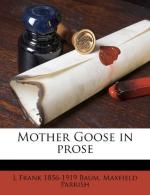Sing a Song o’ Sixpence
Sing a Song o’ Sixpence
Sing a song o’ sixpence,
a handful of rye,
Four-and-twenty blackbirds
baked in a pie;
When the pie was opened the
birds began to sing,
Was not that a dainty dish
to set before the King?
If you have never heard the legend of Gilligren and the King’s pie, you will scarcely understand the above verse; so I will tell you the whole story, and then you will be able to better appreciate the rhyme.
Gilligren was an orphan, and lived with an uncle and aunt who were very unkind to him. They cuffed him and scolded him upon the slightest provocation, and made his life very miserable indeed. Gilligren never rebelled against this treatment, but bore their cruelty silently and with patience, although often he longed to leave them and seek a home amongst kinder people.
It so happened that when Gilligren was twelve years old the King died, and his son was to be proclaimed King in his place, and crowned with great ceremony. People were flocking to London from all parts of the country to witness the festivities, and the boy longed to go with them.
One evening he said to his uncle,
“If I had sixpence I could make my fortune.”
“Pooh! nonsense!” exclaimed his uncle, “a sixpence is a small thing. How then could you make a fortune from it?”
“That I cannot tell you,” replied Gilligren, “but if you will give me the sixpence I will go to London, and not return until I am a rich man.”
“The boy is a fool!” said his uncle, with anger; but the aunt spoke up quickly.
“Give him the money and let him go,” she said, “and then we shall be well rid of him and no longer be obliged to feed and clothe him at our expense.”
“Well,” said her husband, after a moment’s thought, “here is the money; but remember, this is all I shall ever give you, and when it is gone you must not come to me for more.”
“Never fear,” replied Gilligren, joyfully, as he put the sixpence in his pocket, “I shall not trouble you again.”
The next morning he cut a short stick to assist him in walking, and after bidding goodbye to his uncle and aunt he started upon his journey to London.
“The money will not last him two days,” said the man, as he watched Gilligren go down the turnpike road, “and when it is gone he will starve to death.”
“Or he may fall in with people who will treat him worse than we did,” rejoined the woman, “and then he ’ll wish he had never left us.”
But Gilligren, nothing dismayed by thoughts of the future, trudged bravely along the London road. The world was before him, and the bright sunshine glorified the dusty road and lightened the tips of the dark green hedges that bordered his path. At the end of his pilgrimage was the great city, and he never doubted he would find therein proper work and proper pay, and much better treatment than he was accustomed to receive.




